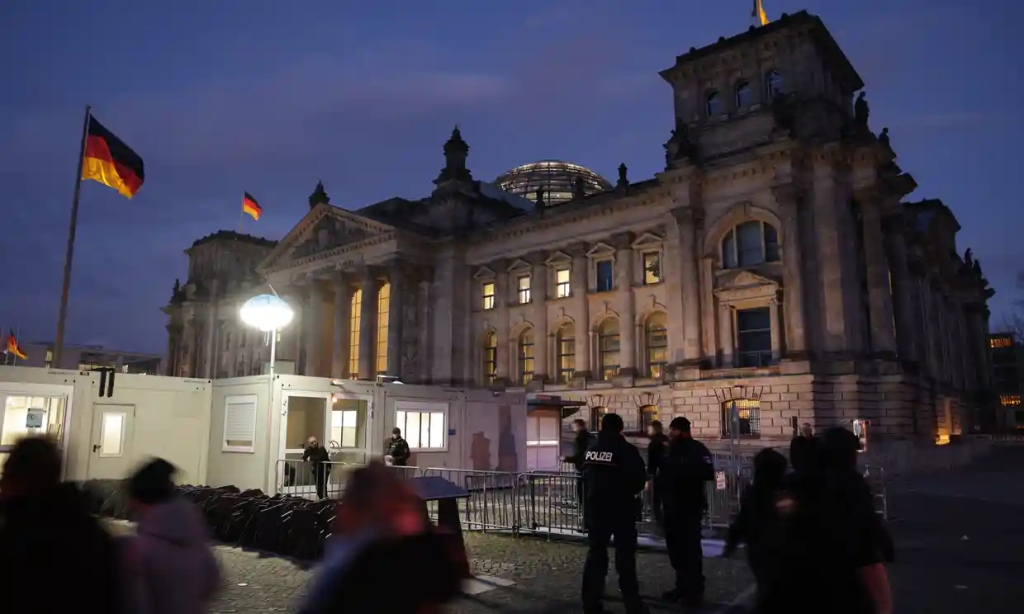COMMENTARY: By Ian Powell
On 14 December 2022 German police arrested 25 people over what was called the “Reichsburger plot”. Two days later The Observer published an article by Philip Oltermann posing the question of whether this was a far-right “…sinister plan to overthrow the German state or just a rag-tag revolution?”
Although a long way away from our shores, this bizarre event has implications for New Zealand which should not be ignored. It got me to thinking about the attempted coups by electorally defeated presidents in the United States and Brazil.
This then led on to considering the occupation of Parliament grounds in early 2022 and a recent sighting in a tiny community about seven km away from my home on the Kāpiti Coast.
In the midst of writing this all up, came the unexpected resignation of Prime Minister Jacinda Ardern last week. Then union leader Robert Reid popped up with a pertinent observation. But first, Germany.
German coup-plotters
Along with 25 other German co-conspirators, one Maximilian Eder was arrested. They were accused of planning to overthrow the state by violent means and install a shadow government headed by a minor German aristocrat.
Few of these coup plotters were well-known public figures. But they included some with a military background, doctors, judges, gourmet chefs and opera singers, a Lower Saxony civil servant at the criminal police office, and “…several of the ragtag bunch of wannabe revolutionaries seemed to have been radicalised in the comfortably well-off, respectable centre of society.”

Eder was a genuine commander of one of Germany’s armoured infantry battalions between 1998 and 2000. He had served in Kosovo and Afghanistan and was a founding member of Germany’s special forces command.
What further rattled Germany’s cage was the inclusion of a former member of the federal parliament from the far-right AfD party. She had knowledge of security arrangements and special access privileges to the complex of parliamentary buildings in the heart of Berlin.
Eccentrics or serious threat?
The plotters’ potential targets included seven members of Germany’s Parliament, including the Foreign Minister, conservative opposition, and two leaders of the governing Social Democrat party.
German police found weapons in 50 of the 150 properties linked to the co-conspirators (there may have been other weapons stashed away elsewhere). This was an insufficient arsenal to overthrow the government of a country with a population of 83 million. However, it was enough to carry out a targeted terror attack killing and maiming many.
The question remains unanswered as to whether these conspirators really did seriously threaten German democracy as it presently exists or were they “…just a bunch of eccentrics with a hyperactive imagination…”

One of the difficulties in making this call is that previously the growth of the German far-right had been under-estimated. The relatively recent electoral success of the AfD party was unexpected. Oltermann concluded his interesting article by citing a German terrorism expert who noted that while he didn’t believe the coup-plotters would have overthrown the government, the question that remained was how much damage they would have caused in trying to.
Washington DC and Brasilia
While we await a fuller analysis of the extent to which these coup-plotters were a threat to German democracy, we know enough to make some conclusions, especially in an international context.
The German coup-plotters may have included eccentrics. But their defining characteristic was that they were from that part of the extreme far-right of politics which was prepared to use violence to achieve their objectives.
There are similarities with two actual attempted coups seeking to overturn election results and putting back into power two far-right presidents who were defeated at the polls. These occurred in the respective capitals of the United States (Washington) in January 2001 and Brazil (Brasilia) two years later.
These attempts to put Donald Trump and Jair Bolsonaro back in power were both far-right led and involved short violent destructive occupations of their parliaments. The major difference was significant high-level military involvement in the attempted Brazilian coup.
Far-right levering off anti-vaccination protests
In February-March 2022 there was an anti-vaccination occupation of New Zealand’s Parliament Grounds. Last February I published a Political Bytes blog on the far-right agenda in this occupation.
My essential point was that the susceptibility, to say the least, of many of these protesters was fertile territory for far-right leaders to exploit, influence and shape its more violent direction. This was well-highlighted in the excellent Fire & Fury podcast documentary published by Stuff.
Fire & Fury: Who’s driving a violent, misinformed New Zealand – and why? Video: Stuff
The documentary has come under some peculiar criticism from those who believe it should have given similar or greater blame for the actions of Parliament’s Speaker in trying to dissuade the occupiers from continuing the protest.
However, aside from overstating his impact, this criticism misses the whole point of the documentary. Its focus was on what was behind the occupation and related protests, including the significant far-right influence and support.
One of the biggest beneficiaries of these protests was the far-right Counterspin Media online outlet. It reported the occupation virtually non-stop, quickly becoming the main source of news for the occupiers and their supporters.
Run by local far-right leaders, Counterspin Media relies on a far-right media outlet in the United States for support (Trump confidant Steve Bannon is in its central leadership). From a very small base its viewing numbers have rocketed upwards.
The occupation also accelerated the use of two new terms to designate some people within the far-right – “sovereign citizens” and “sheriffs”. The former believe they are not bound by laws unless they personally consent to them. They carry out violence although this is largely verbal.
The latter, sheriffs, believe they can take the law into their own hands, including apprehending, violence and even execution. In other words, those holding either designation are vigilantes.
Now to Peka Peka
This leads on to the peacefully seaside locality Peka Peka on the Kāpiti Coast of the lower North Island with a population of around 700. As it happens, it is seven km from where I live. I frequently cycle through it and walk dogs on its beautiful beach.
Its name is derived from a native New Zealand bat, the Pekapeka, which represents the interwoven nature of the spirit world and the world of the living — the seen and the unseen.
But following the end of the occupation of Parliament Grounds a small group of occupiers moved on to the land of a supportive local farmer. While numbers have diminished there are still there.
While driving past earlier this month I noticed a conspicuous vehicle parked outside on the road as photographs I took show. The vehicle belongs to Counterspin Media.
The issue at hand was the far-right’s support for the parents of a critically ill baby who tried to deny him access to a life-saving blood transfusion because overwhelmingly donors are vaccinated. They and Counterspin Media have also denied the right of their baby to privacy by breaching a court order for name suppression. [The matter was resolved by the court overruling the parents which enabled a successful transfusion that saved the baby’s life.]

What was particularly relevant to this blog, however, was the fact that the far-right Counterspin Media was present visiting the small group who among them are believed to include sovereign citizens and a sheriff or two.
It is a very long bow to suggest that the occupation of Parliament Grounds was responsible for Prime Minister Jacinda Ardern’s dramatic resignation last week. Nevertheless its ferocity (including intimidation and threats of execution) and duration rattled her government’s cage and confidence.

Many are attributing Arden’s resignation to the volume and viciousness of the personal attacks on her, much of which was misogynous. They are right to make this conclusion but it is much deeper than this. To begin with, had her government been more successful in policy development and implementation or been doing better in the polls, she was less likely to have resigned.
Former Prime Minister Helen Clark (1999-2008) also came under vicious misogynous attacks but, as she has acknowledged, the attacks on Ardern far exceed those on her. What is the difference? First, social media’s influence in Clark’s time was much less than Ardern’s.
Second, the far-right was politically much less influential than now. We now have far-right governments in countries such as Italy, Poland, Hungary and India. There are strong far-right movements threatening countries like France and Spain. Both the United States and Brazil have had single term far-right presidents.
Germany had a follow-up from the December coup-plotters this week with five more far-right activists arrested for a second alleged coup plot, including kidnapping the health minister, to overthrow the government which The Guardian reported on January 23.
In New Zealand, the far-right’s levering off the anti-vaccination protests has led to an environment of threats through a sense of deluded entitlement, as Stuff reported on January 20, of a magnitude far greater than Clark and her government ever experienced.
Union leader Robert Reid was as close to getting it right as one can get in a Facebook post on January 20. He observed that, on the one hand, unlike the United States and Brazil, New Zealand was able to keep right-wing and fascist mobs from storming their parliaments.
However, on the other hand, in New Zealand they “…scored their first victory of bringing down the political leader of the country. Not a good feeling.”
I agree with Reid but would make the qualification that these far-right influenced and led “mobs” significantly contributed to bringing down a political leader.
Sociopaths and psychopaths
Soon after commencing working for the Association of Salaried Medical Specialists over three decades ago, I asked a leading psychiatrist, Dr Allen Fraser, what was the difference between sociopaths and psychopaths (Dr Fraser was the union’s first elected vice-president and second president).
His response, which I have never forgotten, was to repeat what he advised medical students and doctors-in-training: Sociopaths believe in castles in the sky; psychopaths live in castles in the sky
In other words, while Helen Clark was threatened by sociopaths, Jacinda Ardern was threatened by psychopaths. The transition from the former to the latter was the increasing influence of the far-right.
Robert Reid is right; it is not a good feeling. He is a master of the understatement.
Ian Powell is a progressive health, labour market and political “no-frills” forensic commentator in New Zealand. A former senior doctors union leader for more than 30 years, he blogs at Second Opinion and Political Bytes, where this article was first published. Republished with the author’s permission.

